Text
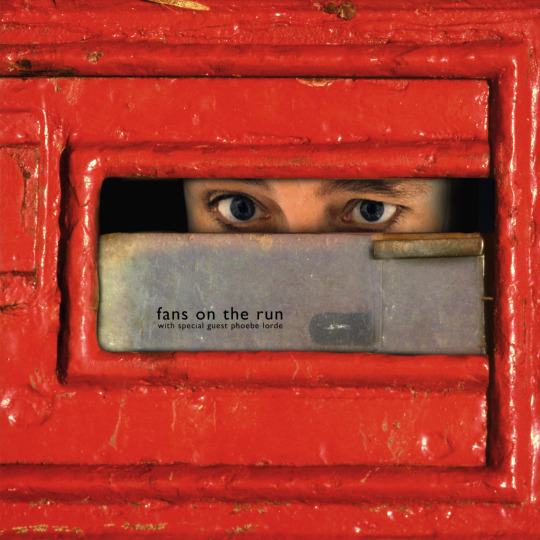

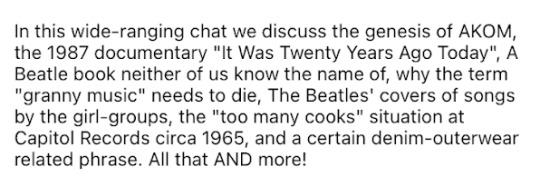
Listen here
22 notes
·
View notes
Text
AKOM “Fine Tuning,” Episode 6: A prolonged jealousy
Another really excellent episode that I will have to listen to at least two more times to fully ingest, despite having lots of diffuse, unconnected notes where I ranted about most of the same text. They really backed up and gave it context and meaning, including adding a lot of things that I didn’t have and making sense of some of the extras that I did. It was both satisfying and frustrating: more satisfying than I expected, and my frustration feels more coherent and focused now.
I definitely think it’s one of the most important episodes.
There is only one point I would add, and that is just that when you listen to the episode it’s important to realize that Paul’s “jealousy” is the most egregiously non-sourced. There are basically two quotes that Mark Lewisohn uses to support this entire theme. The theme which he so beats into the ground that even if you don’t look at the footnotes it feels excessive.
I’ve mentioned before that when I read “Tune In” I was still very, very new to Beatles’ history. A newborn without any of the historiographical context, no understanding of the long, strange, John-deifying background, and therefore I wasn’t on the lookout for it. And that’s important because I went into the book with implicit trust, loved the writing, and still it was evident to me, fairly quickly, that I was reading an opinion column.

It was the cigarettes that did it
Paul’s care with money was noted—Pete says that while they all passed their ciggies around, Paul would “sneak one of his own to himself”—and he was still needling everyone about the Bambi sleeping arrangements, made all the worse now because he was jealous of Pete getting the best girls.
The second time I read the book I remember thinking, “Surely not that many people spontaneously bitched about Paul being stingy with cigarettes.” And that was my tipoff.
There are two quotes in the book about Paul and cigarettes that appear to be organic—one being Pete’s “sneak one of his own” quote in this episode—but you’d think that half the people Lewisohn talked to about their memories of some of the most famous people ever, and certainly the most famous from Liverpool, just magically thought that one of the most important things about these four guys was that Paul was stingy with cigarettes. And there is just no way that that is true.
But I also know how this works, inside out. You get “an angle” as a reporter. You have a story you want to tell, and then you interview people with that story—that angle—in mind. You ask questions that you think will elicit the responses that back up your thesis. And then, on the other side of the process, you filter the quotes you choose (and don’t choose) that tell the story you want to tell. And to be fair, every reporter and historian does this to some extent. It may just be to organize ideas in a coherent way, or it may be to focus on a theme. But it has also notoriously been used by historians to warp the truth and further a broader historical lie. (A very good example of this and the one closest to me is “the Dunning School” of the US Civil War and Reconstruction, the first real and condensed story of that conflict that injected into US historiography many complete lies, including the especially insane one that after the Civil War the “Radical Republicans” inflicted pain and humiliation on the South, which despite being the exact opposite of the truth is still the story most Americans “know.”)
Mark Lewisohn had a story he wanted to tell, and I believe that story is most obvious in his “jealous Paul” theme because it’s based on nearly thin air and even then is so ludicrously overblown. But I think it was just too tempting a canvas for Lewisohn. Setting up a dead, pretty kid as a sort of saint that Paul persecuted does so much work for everything else he wants to say about Paul, especially in the upcoming books. Hamburg becomes a pressure cooker where Paul’s true colors come out, and if Lewisohn can use Stu—a sort of perfect near-blank slate who never had time to put any of his memories into context—as a foil to Paul and to paint Paul as petty and jealous and seething, then all the rest of his work is easy. Stu is a layup that paves the way to seeing Paul as a bad guy. The concrete dries and everything else falls into place.
And look, there just is no way to see this theme as organic, because it’s not. It just isn’t. It’s not based on quotes or stories. There are a few completely disconnected quotes stretched to breaking that he uses to try to prop all this nonsense up with, but there is simply no defense for even 90% of the primary usage of them, and certainly not of the whole, big-picture story he creates with them.
I’m going to give one example—and there are many—but I admit to liking this one best because it’s all there in one passage based on one quote that doesn’t say any of this.
Passage:
But, as much as Paul liked exhibiting versatility, he was unhappy—he felt he’d been lumbered, that his multi-instrumental ability was tying him down. Who looked at the drummer? By rights, his place was out front, especially with his new guitar. Here he was, paying off the Solid 7 at ten bob a week and hardly getting to play it. Jealousy of Stu was stoked: Paul was in the back line while he remained out front (even if he was hiding and in dark glasses). One thing was for certain: Paul wasn’t going to abandon singing.
The only citation for all that Maca-inhabited resentment is the brief Paul quote already in the text, (FN35) and the next footnote—FN36—is from George on a new topid. There is no citation whatsoever to support any of Lewisohn’s finely-sketched fantasies of Paul’s vanity and jealousy.
FOOTNOTE 35: “I was drumming with my hands, playing the hi-hat and bass drum with my feet and I had a broomstick stuck between my thighs on the end of which was a little microphone, and I’m singing ‘Tell me what’d I say …’ It wasn’t easy!”
*Note: This quote is also in the text right under the ‘lumbered Paul wanted to be out front’ passage, so in some ways it’s an even thinner spread, if that’s possible.
So, according to Lewisohn:
Paul liked “exhibiting versatility” (a whole lot because of the modifier “as much as”)
Paul was unhappy because he felt “lumbered”
He felt he was being punished because he was TOO TALENTED
BY RIGHTS his place was out FRONT
He wanted to be LOOKED AT!
Jealousy of Stu is grabbed from thin air, based on nothing, and “stoked” by Lewisohn.
because, again, Stu was out FRONT
Did you catch the point that Paul is CHEAP?
Again, all of that is cited to this:
“I was drumming with my hands, playing the hi-hat and bass drum with my feet and I had a broomstick stuck between my thighs on the end of which was a little microphone, and I’m singing ‘Tell me what’d I say …’ It wasn’t easy!”
There are at least two more things that I want to say but this is long enough so I will put them off. (Hopefully not for long.) ✌🏻
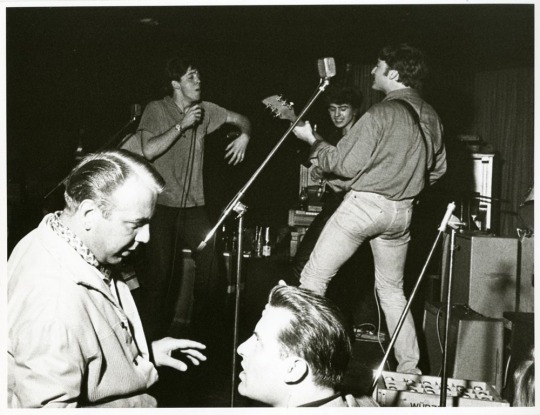
103 notes
·
View notes
Note
Can you tell me about Lewisohn and why he’s so hated? I’m a bit new here and I was recommended a blog that is solely dedicated to hating this guy. Was he a homophobe or did he do something rude to the boys?
Hello anon! I feel your pain. Lewisohn is a controversial figure, and it can be hard to get a read on what people think of him and why.
Lewisohn is writing what he hopes will be the definitive history of the Beatles. He has so far completed volume 1 (which covers from before they were born till 1962), as well as several other books from before he started working on the series.
He is very popular with some parts of the fandom because he has done really extensive research and is considerably better than other authors I could name.
But, there are some serious issues with his work.
First of all, his author bios tend to call him "the acknowledged authority" and his wiki article refers to him as a "historian". I would be slow to apply either of those terms to him. His training and experience are in journalism, and he does not apply modern standards of historical research to his work.
Secondly while his writing is engaging (I read the extended version of Tune In and missed it when it was over) his analysis is often lacking in empathy. For example, he tells us (ad nauseam) how "mean" and "cheap" Paul was, but doesn't take any time to consider the money and family issues Paul was facing that a) didn't apply to the others b) might have caused such behaviour. If the most ambitious and diligent musician in the group won't buy himself a new guitar, maybe he has a reason, you know?
Thirdly, he's weirdly dismissive of oral accounts. Liverpool locals figured out where Paul had his paper round, but it wasn't on a piece of paper, so as far as ML was concerned it didn't count.
Fourthly (this list is getting long) he had some kind of falling out with Paul (and Apple Corps) around 2009. He went from being invited to write Paul's biography to being dis-invited. It's not clear exactly what when on between them, but ML has not acknowledged that it might impact his objectivity wrt his writing.
Fifth he completely ignores queer issues. There's a part where he sort of darkly hints about George's sexuality, but in a childish heternormative way. His treatment of Brian's sexuality isn't completely terrible, but neither is it fantastic. I'd be amazed if he ever addresses the evidence for, eg, John's bisexuality.
One of the most difficult things for me is that he's overtly racist against the Irish in the worst self-satisfied Brit way (apologies to my British readers if that sounds harsh, but it is A Thing).
I would still recommend reading it, but as with all books on the Beatles, you must take it with a pinch of salt. Go in aware of his bias against Paul and his hero-worship of John, and there's a lot to be gained from reading the book, in my opinion.
And I really hope that he'll eventually pass on his extensive research collection as a public resource for actual historians to comb over and analyse.
@wingsoverlagos and @mythserene have done some detailed analysis of specific problems with his work, especially his terrible citation "style". (He merges quotes from different contexts, adds words in square brackets that change the meaning, chops out relevant information, and more). Some of those posts might seem a bit vitriolic if you're coming at them cold, but once you know the context the ire makes sense.
For a really in-depth analysis of the problems with his treatment of Paul in Tune In check out @anotherkindofmindpod's series Fine Tuning.
40 notes
·
View notes
Text
This is a fun collection of quotes from the Let It Be Beatles Interview with Mark Lewisohn conducted on August 20, 2018. This is mostly for @mythserene's enjoyment, but it's also a fun lil supplement to this comment by @talking-perfectly-loud on a post by @anotherkindofmindpod, which includes some revealing, deeply salty quotes by Lewisohn from an episode of Nothing Is Real.
The below soundbites focus on Lewisohn's feelings towards the Harrison estate, particularly Olivia, though Lewisohn also lets us know that he considered suing George at one point. Italics used to indicate tone; bold font is added emphasis by me.
This is from ~1hr8min into the interview, after a discussion of Mal Evans diaries. Here's a partial transcript:
"No, no, Olivia Harrison doesn't want anything to do with me at all. Yeah, so it's very frustrating because I just want to make the history better and better and better and more and more correct, especially more and more correct in terms of balance on all four Beatles, but whatever."
This is a longer clip (6:26) from ~1hr23min in the original interview. They're discussing Lewisohn's falling out with Apple/the Beatles/George in particularly, which came about because he was falsely accused of bootlegging, or something like that. He's told a few variations of this story.
The first 3ish minutes give some flavor and backstory. Some choice quotes (they're at about 2:50, 4:35, and 5:42 in this clip):
“To the day he died, George blocked me, and Olivia blocks me in George’s name, and so it still carries on.”
“I’ve never, ever leaked, and that was why it was so galling to be accused of being a bootlegger. George Harrison accused me of being a bootlegger to my face in front of a whole film crew, the bastard. I mean, really. A horrible, horrible thing to do. I really should have done him for slander, and in fact at one point I was tempted, believe it or not. Because, you know, I’m a professional, I’m on a shoot, I’ve got a whole unit with me, and he’s accusing me of being a bootlegger in front of everybody, which was- he had no evidence for because there wasn’t any, but that didn’t matter. He was accusing me without evidence, and it was wrong, and um, you just have to put up with these things. These people, they can get away with murder. Celebrities, you know?”
Lest we think George was wilding out solely because of the bootlegging, Lewisohn helpfully clarifies that it was also Paul's Fault:
“The irony of that was that I actually had started off really well with George. I knew George from ’87, personally, and we’d had nice times, and it was- one of the things that flipped it was when I began working regularly for Paul.”
This was the part of the podcast that really took me aback, from around the 1hr43min mark. There's some chatter about Let It Be (the film), and then Lewisohn goes off once again about Olivia Harrison. He's quite impassioned, and then seems to make a conscious effort to talk himself down.
“I don’t know Olivia Harrison. I’ve never met her, which makes her- just- [angry] blocking of everything I do so ridiculous, because she doesn’t even know me. But if, as it would appear, she’s taken it upon herself to perpetuate George’s wishes, which is something that you might expect a spouse to do when their partner’s died, if the partner says, ‘Don’t ever allow this’, then she would take it as her duty not to allow it.”
This is followed by some hedging.
There are several other choice tidbits in this two hour Lewisohn marathon, but Olivia Harrison was foremost in his mind. But don't worry, guys, he's not biased!
42 notes
·
View notes
Note
As a fellow Beatles fan (I assume), how do you still love the boys despite some of the bad things they have done, allegedly done, and/or are tied to but we don’t know if they have actually done?
I love them and their antics, but this trips me up every now and then
oh anon.
you correctly assume my fellowship.
we perhaps need a master post to link people to all the answers every beatles blog has to this same anonymous worry.
but my thought pattern is:
a) everyone's terrible it's not just the beatles
and by 'everyone' I mean men. I do get where you're coming from, I have my days, but at the same time it almost surprises me what a big issue this is for people, because all men are awful*. Pretty much any man put in the beatles situation would have been at least as awful - and many worse - than the Beatles.
I'm not saying that to mean 'so they're not that bad!' I'm saying it to mean that every man around you is as bad as they are. Yes even the modern ones. So the thing you're actually dealing with is 'the awful nature of men'... so it's hardly even a question about liking the Beatles and coping with that. It's just about existing in a world where you know what men are like - and coping with that. So you cope with it however you generally make peace with the fact that men don't like women very much... and if you struggle with that you have to read the books where we keep actual feminism, not tumblr.
b) it doesn't matter that much
your enjoyment of the beatles isn't going to bring about world ruination, you don't need to be some pure moral absolute, you're not going to hurt anyone by finding joy in some dickhead from the sixties! you don't pick your favourite with your moral compass, y'know? turning away from them isn't going to change anything that happened, or make anyone feel better, or even make you a better person with more inner peace. you're fine.
it's just about not getting defensive or pretending things didn't happen, or somehow arguing like it doesn't even matter that they hurt people because they could have been worse, or pretending it's all blown up from nothing. that's when fandom becomes a bit shit and ridiculous. it's just very possible to be aware of the terrible things the beatles did and still feeling the thrill of the universe flood through you when Paul screams.
* The bots will find me! The bots will "not all men!" me. You don't have to worry about it or do it yourself, the bots will do it. I will be suitably told off for generalising about the terrible menfolk who are statistically + anecdotally + factually definitely worse than the womenfolk, and I'll be reminded that just because it's true doesn't mean you can just say it, because we're meant to pretend. So you can just scroll by and not worry that I might not get told.
79 notes
·
View notes
Text
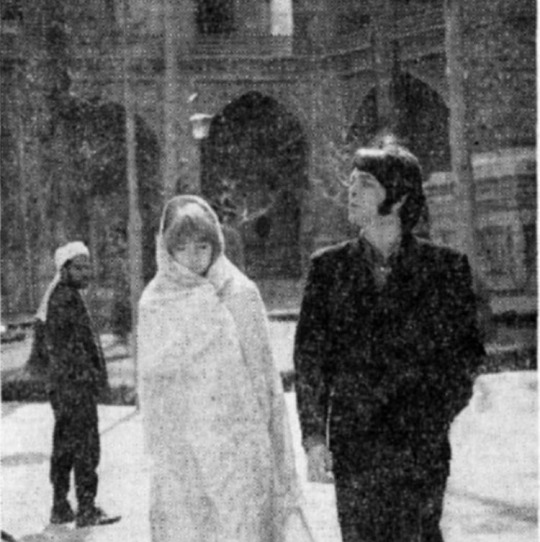
NEW!
Paul McCartney and his then fiancee, actress Jane Asher, visited Iran for 2 days in 1968 on their way back from India, touring historic and cultural sites such as Tehran's Shah Mosque. From [email protected] twitter! 🌸✨
195 notes
·
View notes
Text
#Now and Then#the beatles#paul mccartney#john lennon#everytime I read an article about Now and Then#that highlights the DEEP BOND between john & paul#and the unduring love of the Beatles#I sleep a little better#love this!
16 notes
·
View notes
Text
Absolutely! All this is true. We did not mean anything bad by this oversight and did not mean to imply that we ran Icke's book through google translate. I just listened back to the section in the episode on Icke, and I'm not even sure what I'm referring to when I say "this is from google translate." I think I initially wrote that in regards to his name pronunciation, because I did check THAT through goggle translate (and I messaged pyrm to ask her opinion about it, too).
The correct thing to do would've been to ask beforehand if she wanted a shout-out or thank you. I am never sure whether listeners want to be name-checked (especially since most people on tumblr communicate with us anonymously) but we should've just asked.
In any case, I'll be more than happy to add a thank you in the show notes and of course I will DM @packyourromanticmind as well!
Credit where credit is due
I very much enjoyed @anotherkindofmindpod 's most recent series Fine Tuning but something has been bothering me.
In Fine Tuning - Episode 10: Unseen Paul they discuss Icke's book. Around 1h57m (by Spotify's reckoning -- 1:59m on Apple) Phoebe says she got her translations of Icke's book from Google translate, but I know that's not true. She had extensive email conversations with @packyourromanticmind about the book, in which pyrm shared a full translation of the chapter about the Beatles. When I first heard the episode I assumed that pyrm didn't want to be credited, but I've asked her and she was as surprised as I was that she wasn't mentioned.
pyrm was delighted to go into detail with Phoebe about the book she spent weeks translating with her German-speaking mother. Especially because AKOM would reach a wider audience and help shed new light on the Beatles' experience in Hamburg. She wasn't looking for credit, but it was a bit of a shock to hear all their effort credited to a quick search on Google Translate. (Phoebe's aside where she says "later explaining: oh, I thought you were gay" isn't even from Icke's book, it's from another book that pyrm mentioned while they were talking.)
Those of you who follow @tillthereweretangents (my shared project with @ilovedig) will remember the hard work pyrm and her mother did translating that book for us, and she was invaluable in all our efforts to uncover Icke's story (tracking down out of print books and more). We weren't happy relying on Google Translate to understand Icke's book, and neither was Phoebe.
Credit where credit is due, @anotherkindofmindpod.
28 notes
·
View notes
Text
Paul liked to keep his options open and this applied to friendship. Just when you thought you were getting to know him, to feel a commitment from him, he'd slip behind a smiling mask. Finally I came to accept this aspect of his nature and we worked together, travelled together in a relaxed fashion, but never with any developed contact.
Paul had a real appetite for life -- an exuberant optimism and a buoyant enthusiasm that was admirable even if at times it overwhelmed his sceptical partner, John.
...He lived in his head to create music or lived to create music in his head. This process or activity could account for a certain distance in his contact with people, however pleasant and engaging he might appear.
Robert Freeman, The Beatles: A Private View
260 notes
·
View notes
Note
Hi AKOM! Feel free to reply to this publicly, personally, or not at all; I'm doing this in a format to give you every option.
But I wanted to thank you profusely for what you've done with your Fine Tuning series. I hope that it engenders further conversation (not cancellation, necessarily) around Tune In and the increasing need Beatles fandom and scholarship have to do their due diligence, not least because of the precedent set by Lewisohn himself (both by his previous work and, frankly, the standard he's stated and not held himself to).
This series came at an oddly opportune time in my own journey; the past several months I'd finished the expanded edition of the book, and gone down not a few rabbit holes seeking confirmation of weird sounding quotes and attributions and become increasingly suspicious, but found not much interest from folks about what I was seeing.
So after finishing the book, and around the time you started airing Fine Tuning, I started The Beatles and the Historians, definitely hoping Torkelson Weber would have taken him at least somewhat to task. She didn't, and then I started Truant Boy, an examination of the way we talk about McCartney and art in general, and I feel like my reading/thinking/listening journey was almost cosmically perfectly timed, through no planning on my part.
I've not always agreed with your conclusions but I very much value your voices in the discussion. I'm specifying the first part of that not as a diss or a backhanded compliment but because I know you'll appreciate that we've all got our own opinions but we, ideally, operate in a space where we can hash those out. That's how we get better opinions, better history, better scholarship and better fandom. So I really, really am grateful for what you've done here and I genuinely hope it fosters better discussion in the future.
Thank you, and congratulations, and I hope you're both treating yourselves!
Thank you so much @mydaroga for your kind words and for listening! ❤️
17 notes
·
View notes
Text
I listened to the final ep of @anotherkindofmindpod's Fine Tuning, yesterday. I'm so sad it's ended. I loved every.single.second. I don't think I've posted about it at all, but it's only because everyone was already saying it better, and my posts end up in drafts half finished and confused and full of runaway sentences of little import.
I'm really grateful for the whole thing. Grateful the way I was when I watched Understanding Lennon McCartney the first time, like being given a genuine gift of fandom making sense of itself. I don't know. It's just lovely to have. And it's done so well.
When, in the first ep, they casually mentioned that there were going to be ELEVEN episodes I knew it was going to be amazing. Proper genuine "we have a lot to say and we're going to say it all so you don't think we didn't think it through" you know? I love that they didn't start making eleven episodes and then decide that was too many and cut 40% of it out, it's more like they wanted to make twenty episodes and then cut out about 40% of that. Making eleven episodes and then being like 'we didn't even have time to talk about anything that we LIKED about this book' is a real move. A perfect shiny move.
The fact they made a spreadsheet sends me into fits. I love it.
Cards on the table I have not read Tune In properly, I have skimmed and picked at it, and obviously I've seen loads of it quoted on tumblr, but EVERY quote you read from it (and everything he says in interviews) makes it so fucking OBVIOUS that he doesn't understand basic things, I've never been able to face it full on. And the frustration that people (men) can't see how bad it is. So having it put out there like this, bit by bit, oh the joy of it.
And then it's also so much worse than I knew, because I'd never really worked out that he was just MAKING UP QUOTES and mushing them together to say new things, and oh my god the stuff that's NOT in there, is insane. The bit in episode 3 where AKOM quickly list off about five or six really interesting things about Paul's art in his schooldays and then you find out that Tune In didn't even MENTION that he liked to paintklsjdofihoijsodijfohwoisjdf OH MY GOD.
I'm blown away by the work of it, and the scale of it, and how well put together it was. I love the *feel* of it. I love its tone when they let the sarcasm ride high. The voices of "sincere surprise" are just my favourite thing. "Oh, so he mentions that Paul did x and y right?" "Actually, weirdly he doesn't!" "Oh, HOW STRANGE. But does he say he was interested in z???" "Oddly no." I love the sense of giddy anticipation in the intro ep, it must have been killing them to have made so much of it and not be able to talk about it.
I'm so fully aware that all of what they're saying will move into other podcasts, and become things that men sort of talk about as if obviously everyone kind of sees the bias in Tune In, even though they've always talked about it as if it's a great work of truth until now. It kills me softly. And they'll claim it's only POSSIBLE to see that now, ten years later when it's spelled out to them, as if it's aged badly or something, when actually female fandom has been fucked off with Tune In for fucking years. But that's FINE. WHATEVER.
Also glorious have been all the posts people posted around it, and how the conversation grew, and especially the fact that @mythserene had clearly been doing a lot of the same work. Her posts in tandem with the show are so wonderful, and make it even more special, the depth of fandom for the love of fandom <3333333
62 notes
·
View notes
Text
Call him “Epstein” – How far is Mark Lewisohn willing to go to force a false narrative?
“I don’t care what you think of Klein, call Klein something else. Call him ‘Epstein’ for now, and just consider the fact that three of us chose ‘Epstein.’”
John Lennon to Jann Wenner, Rolling Stone, May 14, 1970
I keep asking “Why do you want me to believe John —(or George or Paul or or or)—said this?” And I keep asking because that is the question that keeps coming out of my mind, my mouth, and my keyboard.
It's the obvious question.
When you’re going to so much trouble to quote shop and quote twist, there's a purpose beyond the pure joy of torturing words. You are trying to prove a point and there’s no real quote to support your position, so instead of changing your position, you act like Beatles’ words are appetizers in a buffet.
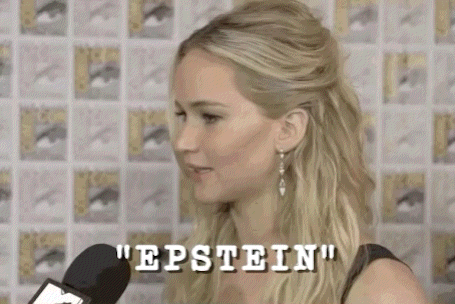
THREE OF US CHOSE EPSTEIN.
This premeditated and purposeful OBSCENITY has been sitting there for ten years. Two ladies with a podcast found it.
However, John remembered Paul’s attitude to Brian being very different. John was always emphatic that Paul didn’t want Brian as the Beatles’ manager and presented obstacles to destabilize him, to make his job difficult … like turning up late for meetings. “Three of us chose Epstein. Paul used to sulk and God knows what … [Paul] wasn’t that keen [on Brian]—he’s more conservative, the way he approaches things. He even says that: it’s nothing he denies.”(72)
I will never—NEVER— get over this one. There may be more shocking things to come, but it was this revelation that made me look at every one of Mark Lewisohn’s “author interviews” differently.
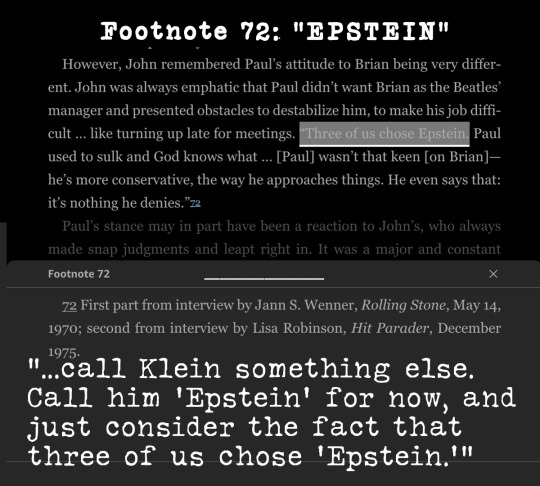
This is when I realized that there is nothing I would put past him.
Listening to that part of Episode 7 is so funny to me now. Daphne and Phoebe kept trying to stick to the outline and ask “Does this quote back up Lewisohn’s thesis?” but it was very difficult because they were in such total disbelief at Mark Lewisohn’s deception. (My label, although it’s a pretty inarguable one.) It is genuinely almost unbelievably dishonest. AKOM had a whole show filled with whoppers to get through, and they kept trying, but it took them awhile to move on because air-quotes-Epstein was like a magnet that kept pulling them back. So yesterday, to get out of editing some of my own mess, I put together a few of the times that the shock sucked them back in.
“I find that kind of shocking, really.” Tiny compilation of Phoebe and Daphne in disbelief over Mark Lewisohn’s purposeful misrepresentation of a quote of John Lennon talking about Allen Klein to attempt to show that John thought Paul was trying to thwart Brian Epstein. (Episode 7)
And most of us strongly suspect where Mark Lewisohn is going with this. He wants to rehabilitate Allen Klein because John can literally never be wrong—or perhaps an even stronger motive—he wants Paul to be very, very wrong. But whatever his motives, we can see what he’s doing. And we don’t have to just suspect, because he has already told us that he is going to use some of his most unforgivable lies to shape that narrative.
And there’s only one reason to do that: because there are no real quotes to back up the narrative he wants to push.
It tells us, in no uncertain terms, that the narrative he wants to push is quite literally unsupportable.
To make it work, Lewisohn has to lie about what John Lennon actually said.
*This post was first going to be about both the “quotes” that Mark Lewisohn references here, but in the end I couldn’t not give “call him ‘Epstein'” its own post. Which means I have actually shortened a post. (Please clap.)
Every ‘quote’ in the “spanner in the works” section is bullshit. Every. Single. One. I’m not going to the thesaurus for a fancier word. They are bullshit. Complete and utter, doctored, twisted, bullshit. The man is lying. And what really chaps my ass is that he is flat out telling us that he is going to use those same lies to push his bullshit narrative of the breakup. Like damn, that takes a lot of nerve.
Here is Mark Lewisohn telling us, straight out, that it’s these same bullshit quotes that he plans on using again to fool us. And he should be a laughingstock when he does. Not in some quarters. In all.
He must think we are such dupes. Although he’s gotten away with it so far, so up until now he hasn’t been wrong.
(There’s a bit more to this part of the Q & A and it’s all bad, but for this post I decided to leave it at Mark Lewisohn telling us that he is going to use the exact same sources he used for the “spanner” section to push this lie in the upcoming books.)
Fool me twice…
Would John and George have seen the parallel between Epstein and Klein in 1969? LEWISOHN: ❝Yes. I’m sure the answer to that is yes, because John mentioned it in interviews, probably in Wenner’s, maybe the one with McCabe and Sconfeld— Schonfeld. Yes.❞ (📍Nothing is Real)
Transcript:
Q. In Hornsey Road you were talking about the three-to-one Allen Klein split, and I was saying to you that it seemed to me that it paralleled what is mentioned in Tune In about, uh, the appointment of Brian Epstein. That- that Paul was sort of holding back or was not keen to move forward with Brian Epstein. And I suppose my question was, is there a direct parallel there? And would, in 1969, John and George in particular have been conscious of that parallel?
LEWISOHN: Yes. I’m sure the answer to that is yes, because John mentioned it in interviews, probably in Wenner’s, maybe the one with McCabe and Sconfeld– Schonfeld. Yes. John recognized that.
Nothing is Real Podcast • October 16, 2019, Episode 15 • Mark Lewisohn, Part II
---
And just remember that this is only one half of a hellacious Frankenquote.
(But I kept it short. 🎊 )
51 notes
·
View notes
Text
Fine Tuning further listening
Mark Lewisohn Podcast and Interview Recs
Audio for most of these interviews can be found on Mark Lewisohn, a Beatles Historian, a beautifully maintained fan-made YouTube channel that has archived almost all of the interviews on this list.
Interviews are linked directly to Apple podcasts, when possible. (YouTube links also included when applicable.)
Interview with Jean Louis-Polard, 2014
Topics of note: Neutrality and lack of bias
Fabcast podcast, 2017
013 MARK LEWISOHN (YouTube)
Topics of note: The 80s and Paul McCartney’s solo career
Humans in Love podcast, 2018
#1 (Part One) Beatles Authority Mark Lewisohn
Topics: Paul’s reaction to John’s murder
Fab4Cast podcast, 2019
Talking to Mark Lewisohn: #1 Writing The Beatles' History and #2 Spring 1969 (YouTube links: #1, #2)
Topics: Heroin; Allen Klein; the Liberty Bell; John and Yoko’s wedding; Paul and Linda’s wedding
Nothing Is Real podcast, 2019
The Mark Lewisohn Interview #14 Part One and #15 Part Two
Topics of note: Tensions with Apple
Interview with Giljs Groenteman, 2019
Topics: Unbridled enthusiasm for John
I Am the EggPod podcast, 2019
The Star-Club tapes (YouTube)
Topics: John’s leadership; intention to make all his research accessible after the books are published
From Me To You podcast, 2020
Mark Lewisohn In Conversation w/ Richard Courtney (YouTube link)
Topics: Philip Norman; today’s “anti-John stuff”
Let It Roll podcast, 2020
Mark Lewisohn in Conversation w/Nate Wilcox (YouTube)
Topics: The “no greater buddy” incident; Lewisohn defending Paul
Let It Be Beatles podcast, 2020
Mark Lewisohn - The Complete 2020 Let It Be Beatles Interview Podcast (YouTube)
Topics: The benzedrine incident; John’s threesome with Royston Ellis; the 444 meeting and Geoff Emerick.
Fans on the Run podcast, 2022
Ep 73. Mark Lewisohn
Topics: Working for Paul; tensions with Apple
68 notes
·
View notes
Text
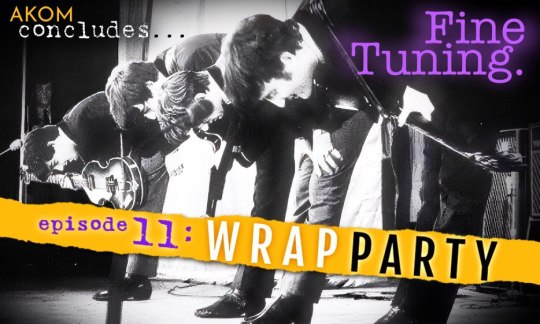
Fine Tuning: Ep 11: Wrap Party
In our final episode of Fine Tuning, we summarize our conclusions, respond to listener feedback, issue corrections, share our hopes and fears for future books, and offer our thoughts and predictions on the future of Beatles scholarship.
Thanks to all who have listened to our series!
Listen HERE
35 notes
·
View notes
Text
Look for the final episode of FINE TUNING tomorrow!

13 notes
·
View notes
Text
A BEATLE DIDN’T SAY THAT! Lewisohn’s lab-created quotes
“One of the things about this book that is a strength is it’s not me saying anything, it’s them or other people. I shape the text, I plot where it goes, I weave it, but the quotes are theirs. And so when I’ve got Paul McCartney behaving in a way some readers might think, ‘Whatever, oh dear,’ it’s actually him saying it. So you end up thinking that to his own credit he said that. It’s not me saying it.” (Mark Lewisohn, ‘Noted,’ (October 7, 2013) Somerset, Guy.)
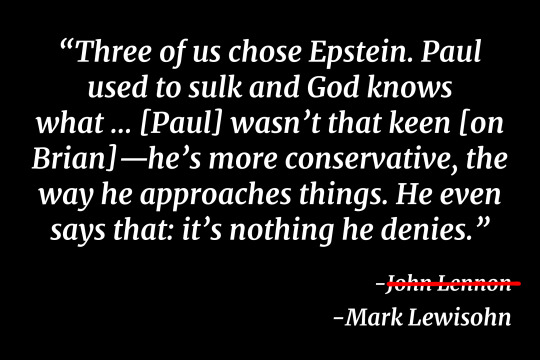
This is hella long, and that's because it's actually a full blog post. (In case you want it in a less monstrous form.)
A lot of people for a long time have put a lot of trust in Mark Lewisohn’s footnotes. Or at least in the fact of those footnotes. Because once you dig through them for any length of time you quickly discover that Mark Lewisohn’s footnotes hold secrets that would get him expelled from any undergraduate program. They reveal a “history” often contrived through a mass of Frankenquotes, ala carte creations, Lewisohn rephrased ‘paraphrases,’ and worse. For some parts of the narrative things aren’t too bad, yet in others monsters lurk around every corner. But this is not the sort of thing that’s graded on a curve, and it is past time to have a conversation about what standards should be accepted in Beatles’ scholarship.
Lewisohn lists his sources unlike most others. And his footnotes alone are more insightful than some other writers’ books. (Reddit, r/beatles)
I do not judge footnotes based on their insightfulness, nor do I want to single out a redditor, but I grabbed the comment because it’s an opinion that is widely shared and even accepted as cannon. At least by people who have not combed those freakish footnotes. And while the pages of piled up sources do look fearsome en masse, a closer inspection reveals an offense to the truth, a threat to the record, and a blight on Beatles’ historiography.
“The rules for writing history are obvious. Who does not perceive that its chief law is never to dare say anything false, and never dare withhold anything true? The slightest suspicion of hatred or favor must be avoided. That such should be the foundations is known to all; the materials with which the building will be raised consist of facts and words.” –Cicero
A Look at Lewisohn’s Lab-created Frankenquotes
FIRST, WHAT ARE QUOTES? AND WHY ARE QUOTES?
Quotes are the soul and center of recorded—and recording— history.
And the rules around quotes and quotation marks are pretty simple. Most people, even if they’ve never written anything beyond a term paper, understand what quotation marks represent.
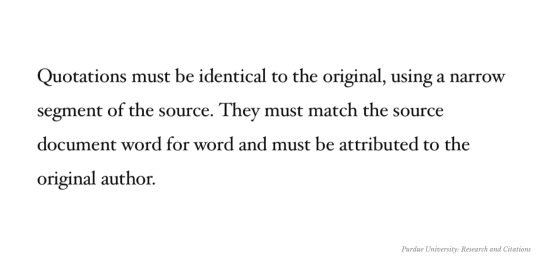
A set of quotation marks means, “This person said or wrote ‘these exact words’ at some given time.” You can smash a quote from two hours before or two years before right up against a separate quote to make your point—although it might get your grade lowered—but what you cannot do is take two different statements from two different times and make them seem like they are one statement.
When you put words inside one set of quotation marks you are stating, in black and white, that the identified person made this statement. That they said all those words together—or if you want to excise a reasonable part and use ellipses to represent that— as part of the same statement.
Look, combining two separate quotes that are not part of the same thought or topic is not a subjective issue. It is not an issue of controversy. Quotes are the bone marrow of written history. Quotes are the alpha and omega. In academic work or journalism they have to be, which makes sense as soon as you think about it. If it was cool for me to take a transcript and grab half a sentence from page 2 and half a sentence from page 17, push them together as if those words were spoken one after the other in a single thought, I bet I can manage to get those words to say almost anything I want.
Separate thoughts must be in two separate quotation marks. Separate. Somewhere between four sentences and a paragraph is widely accepted as the “two separate quotes” line, and there can be some ethical and technical wiggle room in a long rant by a person, but what makes all that subjective nonsense go out the window is if the quotes come from two separate questions. Or two separate days. That’s two quotes. Not hard.

Which again, makes sense if the point is conveying information to the reader and lessening the chance of a writer manipulating someone else’s words to express something that the person didn’t mean.
This is the contract inherent in a quote. These are the rules we all agree to and understand, and these are the reasons why. And there’s no reason to break them.
Why do you want me to believe that John said these two things at one time? What was wrong with what he did say?
THE FOUR MOST COMMON WAYS MARK LEWISOHN MAULS THE MEANING OF THE QUOTE:
The Basic Lewisohn Frankenquote 🧟♂️
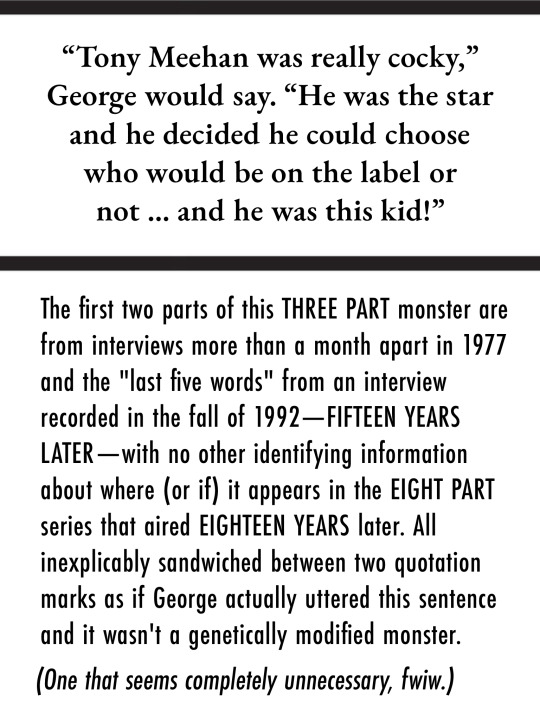
(“CONCLUDING FIVE WORDS FROM—” – I cannot even see the point of this THREE PART monster. Full footnote reads: 9) Author interview with Tony Meehan, September 6, 1995. (“I met George again in 1968 and for some reason he was harboring a grudge against me. He was very, very uptight about it—’You blocked us getting a recording contract …’ ”) First part of George quote from interview by Terry David Mulligan, The Great Canadian Gold Rush, CBC radio, May 30 and June 6, 1977; concluding five words from interview for The Beatles Anthology)
This three-headed monster attributed to George Harrison is a very dull little guy. Not particularly venomous. Just convenient, I guess. For whatever reason, Mark Lewisohn decided it was worth rummaging through the quote buffet until he collected enough pieces for George Harrison to say this thing. “…concluding five words from…” What are we even doing here? No, really. Please tell me.
And like a lot of the footnotes for these bespoke quotations, there are further problems. “[F]rom interview for Beatles Anthology”? An interview that aired? In one of the episodes? Can you narrow it down? I guess I’ll just have to listen very closely to them all and hope I don’t miss the five words.
But if we got bogged down in the sorts of trivial details that would immediately lose a college student a letter grade off a History 101 paper we would never get anywhere. We have to stick to the violent felonies.
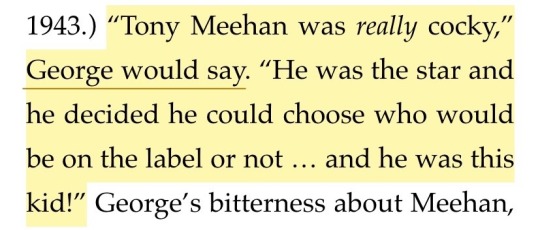
*Love the "George would say——" Uh, would he? Well, I guess after all that trouble you went to, he would now. It's really incredible how cavalier Lewisohn is about a Beatle's words.
These sorts of reconstituted, lab-engineered, made up “quotes” are shot throughout Tune In. “Quotes” made up of words from two, three, and even four sources, spoken months or often years apart.
Ala Carte Creations 🍱
It really is a buffet, and these ala carte creations come in all shapes and sizes. They might just be words that have been plucked up and glued back together to make something more useful to a particular narrative. (Ellipses or dash optional.)
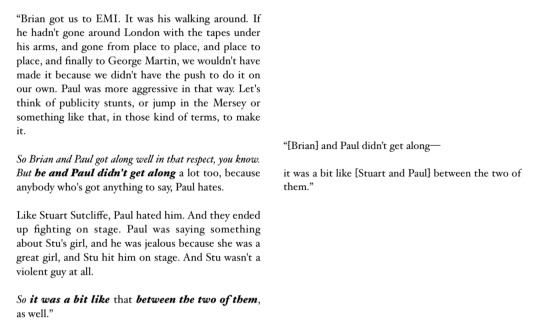
TUNE IN: “John saw a bigger picture, and it would be surprising if it wasn’t equally obvious, or made obvious, to Brian and George. He likened Paul’s enduring snag with Brian to his other long-standing difficulty: ‘[Brian] and Paul didn’t get along—it was a bit like [Stuart and Paul] between the two of them.’” (Footnote 37: Interview by Peter McCabe and Robert D. Schonfeld, September 1971)
Bonus 🍒 Phoebe's dramatic reading of John's original quote:
The Donut 🍩
Then there are a seemingly uncountable number of “quotes” with a sentence or three ripped out from the middle, but with zero representation that more words were ever there. (And in most of these particular deceptions, the simple representation of something excised (. . .) would make the quote fine. There are a lot of these, but they are also the easiest to fix.)

Chapter 10: “I was in a sort of blind rage for two years. [I was e]ither drunk or fighting. **It had been the same with other girlfriends I’d had.** There was something the matter with me.”
And then there are the true buffet bonanzas, words lifted and twisted beyond recognition until they say something brand spanking new.
However, John remembered Paul’s attitude to Brian being very different. John was always emphatic that Paul didn’t want Brian as the Beatles’ manager and presented obstacles to destabilize him, to make his job difficult … like turning up late for meetings. “Three of us chose Epstein. Paul used to sulk and God knows what … [Paul] wasn’t that keen [on Brian]—he’s more conservative, the way he approaches things. He even says that: it’s nothing he denies.”
The Lewisohn Remixes 🍸
And then there are the “paraphrases.” I couldn’t even begin to guess how many of these there are, and often they aren’t even paraphrases, but whole new Mark Lewisohn re-interpretations with quotation marks slapped around them. But if you don’t check, you probably won’t know, because like this Lewisohn rewrite of a well-known Mrs. Harrison quote, there’s a good chance you’ll recognize the bulk of it, making it less likely that you’ll catch the scalpel work excising Paul. And while I don’t want to get caught in the nooks and crannies of intent in an example like this one I have to say, just this once, that what has to be a purposeful excising of Paul to create a slightly new quote on one side, combined with a badly acted, bad faith—(or bad scholar)—“Where was Paul when John’s mom died?” on the other, is par for the course.
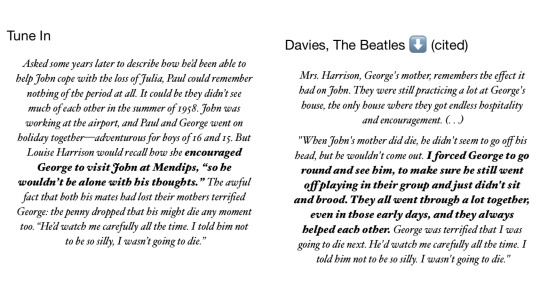
George Harrison’s mom’s made up Lewisohn rephrase which coincidentally removes Paul from the imagery.] ❦ LEWISOHN:“ Asked some years later to describe how he’d been able to help John cope with the loss of Julia, Paul could remember nothing of the period at all. It could be they didn’t see much of each other in the summer of 1958. John was working at the airport, and Paul and George went on holiday together—adventurous for boys of 16 and 15. But Louise Harrison would recall how she encouraged George to visit John at Mendips, “so he wouldn’t be alone with his thoughts.” ❦ DAVIES: “They were still practicing a lot at George’s house, the only house where they got endless hospitality and encouragement. . . . I forced George to go round and see him, to make sure he still went off playing in their group and just didn’t sit and brood. They all went through a lot together, even in those early days, and they always helped each other.”
Why do you have to slice and dice and reconstitute people’s words? No writer, and certainly no historian, should ever feel empowered to take words from a historical figure from two or three different places and topics and times, splice them together, and tell us, “Winston Churchill said this.” No he didn’t! Why are you so intent on changing the words of the people you’re writing about? What’s wrong with just using two different quotes?
You cannot take two or three quotes from two or three or even four separate statements, stick them between one set of quotation marks and say John or Paul or George or Joe Smith said this.
No they didn’t. They never said that. Why do you want me to think they did??
All these words are Abraham Lincoln’s, but this is not a Lincoln quote:
“Every man is said to have his peculiar ambition. Whether it be true or not, I can say for one that I have no other so great as that of — making a most discreditable exhibition of myself.”
(I kept it ridiculous, although I didn’t have to.)
But I want you, the reader, to be saying to yourself, “Okay, enough already. I get it!” Because in the last few days I have wandered too far into the weeds too many times and written far too many words detailing the multiplicity of ways Mr. Lewisohn does violence to each and every law of reporting historical facts, and could write many more. And I will post a more detailed list of the crimes against the quote that I am charging Mark Lewisohn with as we go forward, but I don’t think we need that now. The fact is that every fair-minded person knows what quotation marks represent, and there is no more fair-minded group of people than serious Beatles fans and scholars. And it is those fair-minded scholars who I want most to hear me. Whether you’ve written books or host a podcast or just know that you know a whole lot of stuff and take seriously your part of the trust in preserving the truth about The Beatles for us and future generations, it is you I am really talking to. My Cicero quoting-freaks. The ones who care about getting it right.
“The chief, the only, aim of style is to put facts in a clear light, with no concealment.”
- Lucian of Samosata
What footnotes can do, and what footnotes can’t.
You can list multiple sources in a single footnote. That’s not only fine, it’s correct. If I want to tell part of a story based on several sources, that often means several sources in a footnote. But not for one, single quote.
The problem isn’t the footnote, it’s the bioengineered quote on the page that you swept under a footnote hoping I wouldn’t notice.
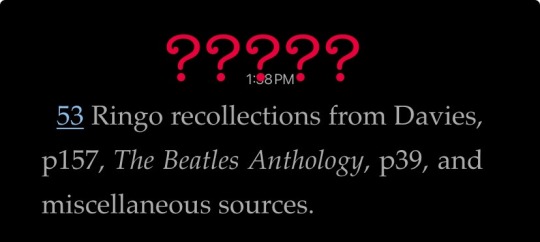
Which leads us to what a footnote is not. A footnote is not a post-hoc fixative for your textual sins. You cannot do whatever you want as long as you confess it in a footnote. A footnote is not a magic spell. A footnote is not the universally understood symbol for “I have my fingers crossed behind my back.” You cannot fix lies and misrepresentations in the footnotes. Footnotes aren’t for trying to chase down three different sources to match up which part of a manufactured “quote” someone said on which date. Footnotes are not the picture on the front of a puzzle box. I should not need to find corner pieces to figure out which of these George Harrison words were actually spoken together.
Footnotes are a truthful and independently verifiable record of primary sources. It’s that simple.
And taking Mark Lewisohn completely out of the picture for a moment, I feel sure we can all agree that neither John Lennon nor Paul McCartney nor George Harrison nor Ritchie Starkey would want anyone rearranging their words as if they were guitar chords. You wouldn’t take three-quarters of Penny Lane and one-quarter of Across the Universe, put them together and call it a Beatles‘ song. So don’t take three quarters of John to Jann Wenner and one-quarter of John to Lisa Robinson, put them together and call it a Beatle’s quote.
MY PERSONAL STANDARD IS THAT IF SOMEONE REPRESENTS, “A BEATLE SAID THIS,” IT BETTER DAMN WELL BE SOMETHING A BEATLE SAID.
None of the Beatles, dead or alive, would be cool with their words being taken out of context at all, let alone two or three different statements on god knows what being combined into one. This isn’t hard, though. Use two or three separate quotation marks, and don’t take statements out of context. Don’t mix and match their words, but don’t twist them, either. If a person said something, it is the historian’s duty to represent those words to the best of your ability, and then use them to tell a factual story focused on what you feel is important. Staying true to the original words and true to their meaning. If you can’t use those words without twisting them, then change your story to fit their words, not the other way around. If their statement helps tell the story your way, use it! For goodness sake, John Lennon said at least two opposing things about almost every topic on earth, so there should be enough to choose from without being deceptive. I actually want the truth. Don’t you?
Biography is story based around accurately represented, trustworthy and verifiable facts. And look, Beatles fans, whoever your favorite is: we are not going to get the truth about his history if we don’t learn to take these things seriously. Let’s have—if not high standards—at least the lowest generally accepted standards. In the mid-term we need a lot more Beatles scholars with a lot more points of view, and now—right now—we need experienced Beatles scholars to prioritize searching out and finding smart, interested people to mentor. And we simply must ensure that we aren’t allowing to solidify into stone “facts” that are not facts and statements no one ever made. I don’t think any honest Beatles fan—(which rounds up to all of them)—wants any question around that issue.
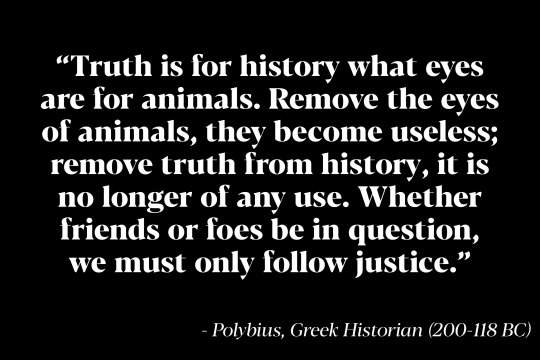
The record is the most important thing. Now, and always. This is not about John versus Paul. John versus Paul may live on always in our hearts, but for Beatles history, it’s the wrong question. I’d rather someone be up front about their loves, but in the end the focus should be on representing the primary facts in their most pristine form. Love who you love most, but place truth above all. Pristine facts. Pristine quotes. Nothing hidden. Nothing misrepresented.
Let the historical actors speak for themselves. That is their right.
And the historian’s duty.
NEXT, WE DISSECT A MONSTER.

Final note: I became frustrated and (maybe strangely) offended by Lewisohn's obscene pretenses in 2020, but my frustrations were nebulous and unfocused until this incredible AKOM series. I feel much better now. Angrier. But better. They worked their asses off. 🥂
161 notes
·
View notes
Text
Mocking Paul
Tune In’s take on Paul’s “Uncool” Musical Tastes
NOTE: The purpose of this analysis is not to exaggerate the severity of John’s onstage behavior which could have (at least occasionally) been conducted in good fun and camaraderie. The object is to determine whether or not Tune In is capable of presenting John’s disruptive and/or undermining behavior objectively in a way that allows the reader to judge the appropriateness of such behavior.
–
Multiple times throughout the book, Lewisohn writes with seeming approval about John undercutting Paul’s “soft” songs or musical tastes.
Here are five examples of this happening live, onstage:
On page 614, Lewisohn tells us how “Paul would flutter his eyelashes when he sang certain songs,” and calls "Somewhere Over the Rainbow” “one of [Paul’s] flutter numbers, guaranteed to go down a storm with the girls.”
Tune In describes John teasing Paul onstage: “John pointed to Paul, burst into raucous laughter and shouted, ‘God, he’s doing Judy Garland!’ Paul had to keep singing in the knowledge that John was pulling crips and Quasis behind his back or making strange sounds on his guitar to interrupt him.”
Of this, Lewisohn writes, “There were always several simultaneous reasons why an audience couldn’t take their eyes off the Beatles.”
About “Besame Mucho,” we get a quote from Lindy Ness: “When Paul sang ‘Besame Mucho,’ John used to stand behind him and make cripple faces. He had to: Paul was asking for it.” (p761).
During “A Taste of Honey,” John interrupts Paul’s performance by yelling at the audience. Lewisohn calls this behavior an example of “the Nerk Twins’ chemistry” (p1178).
When Paul sings “Till There Was You,” “[John] speaks most of the lines in a persistent piss-taking echo: ‘No, I never heard them at all’ (‘No, he never heard them’)” and Lewisohn writes, “[Paul’s] not even necessarily cross about it—he knows it’ll happen because this is John, and John is his fairground hero.” He also writes, “It’s part of the double-act, one among so many reasons they're special together” (p1178).
Also about “Till There Was You”: “John really had a go at Paul for singing this—but didn’t try to stop him doing it, recognizing there was scope for all kinds of music in this group, to please all kinds of audiences” (p615).
Does it sound like John is preoccupied with projecting a “cool” image? We think so. Perhaps his undermining behavior garnered the praise and approval of a few (like Lindy Ness), but it could hardly be described as supportive of his partner (or reflective of good “leadership”).
And yet, Tune In always assures us that John is being awesome. Sometimes even a "hero."
Instead of dispassionately framing John’s behavior as immature or insecure upstaging, Lewisohn calls John’s attention-seeking antics a part of John and Paul’s “chemistry,” which is “special” and a “[reason] why an audience couldn’t take their eyes off the Beatles.”
And, of course, we hear once again that John is Paul’s “fairground hero.”
Somehow, by mocking Paul doing his “flutter numbers” John is “recognizing there’s scope for all kinds of music.”
Note that, according to Tune In, Paul himself isn’t recognizing scope by choosing and singing the songs (even in the face of mockery); John is recognizing scope by allowing him to do it (while simultaneously making fun of him for it).
–
Our final example is one where John doesn’t even allow Paul to finish his performance, and Tune In uses this to pay John the biggest compliment yet.
Regarding the Beatles’ live performance of Elvis’s hit single “Are You Lonesome Tonight”, only days after its release:
“Paul set down his guitar, clasped the microphone and did his Elvis act, the great solo star crooning his new slow one. It was already going to pot when he went into the long spoken-word middle section about ‘all the world’s a stage,’ which he’d crammed into his brain inside a few hours … and then John just stopped the group dead.
Refusing to be involved in anything so corny, John completely took the piss out of Paul, ripping his close mate and bandmate to shreds in front of everyone. ‘They sent me up rotten,’ Paul says, ‘especially John. They all but laughed me off the stage.’”
So from this description and Paul’s quote, we can surmise that the Beatles had rehearsed and prepared the number, “spoken-word middle section” and all. Why then, did John not object to the corny, spoken-word interlude during rehearsal? Assuming John’s mid-performance "piss-take" was not a comedy routine pre-planned by all the Beatles, this anecdote suggests that John knowingly set Paul up for public ridicule and relished the opportunity to pull the rug out from under him onstage.
To be clear, this would be a perfectly fine choice if Paul was in on the joke and consented to the bit. But deliberately setting Paul up to fail is unambiguously un-cool.
Nevertheless, here’s how Lewisohn justifies John’s behavior:
“This was the way John dealt with things, and he also knew the Beatles must have a solid front line, not back a soloist. As he said, ‘Every group had a lead singer in a pink jacket singing Cliff Richard-type songs. We were the only group that didn’t … and that was how we broke through, by being different'” (586).
There’s no reason to connect John’s quote about “being different” to this anecdote (the footnote indicates his quote is taken from a December 1969 interview called “Pop Goes the Bulldog”) except to spin John’s behavior in the noblest way possible.
Paul wasn’t trying to be “a lead singer in a pink jacket”—he was merely taking the lead vocal just as John and George did in their turn. Did John also stop the band dead in the middle of his own solo spots, in order to ensure they kept a “solid front line” that would allow them to “[break] through by being different"? Of course not. John is simply covering his embarrassment here, insecure about perceived softness, and seeking negative attention.
(For readers who may think we're overblowing this topic, imagine for a moment if Paul was doing this to George Harrison onstage. Would Paul’s behavior be praised?)
It’s outrageous for Lewisohn to spin John's every behavior into something awesome (“audiences couldn’t take their eyes off”; “fairground hero”), visionary (“we broke through by being different”), egalitarian (“solid front line”) broad-minded (“recognizing there was scope for all kinds of music”), and indicative of a GOOD PARTNER, actually (“part of the double-act”; “Nerk Twins’ chemistry”; “special together”).
Meanwhile, Paul is “asking for it” by doing “flutter numbers” “guaranteed to go down a storm with the girls,” “making his eyes big,” being “so corny,” and trying to be “the great solo star,” like a Cliff Richard knockoff “in a pink jacket.”
Does this portrayal look even-handed?
—//—
FULL EXCERPTS:
“[‘Are You Lonesome Tonight’] came out in Britain on Friday, January 13, and they did it the next night at Aintree Institute. Paul set down his guitar, clasped the microphone and did his Elvis act, the great solo star crooning his new slow one. It was already going to pot when he went into the long spoken-word middle section about ‘all the world’s a stage,’ which he’d crammed into his brain inside a few hours … and then John just stopped the group dead.
Refusing to be involved in anything so corny, he completely took the piss out of Paul, ripping his close mate and bandmate to shreds in front of everyone. ‘They sent me up rotten,’ Paul says, ‘especially John. They all but laughed me off the stage.’ This was the way John dealt with things, and he also knew the Beatles must have a solid front line, not back a soloist. As he said, ‘Every group had a lead singer in a pink jacket singing Cliff Richard-type songs. We were the only group that didn’t … and that was how we broke through, by being different’” (586).
—//—
“We always requested Paul to sing ‘Long Tall Sally.’ He used to say, ‘I can’t do it because it kills me throat,’ but then he would. He’d announce, ‘I’m doing this one for these two flossies over here,’ or something like that. Girls used to say his eyes were like mince pies. He had long eyelashes and would deliberately flutter them, and though you knew he was always aware of himself, he was so friendly to everybody that you couldn’t help but like him.’
—BERNADETTE FARRELL
One of the flutter numbers was ‘Over the Rainbow,’ guaranteed to go down a storm with the girls. The song from The Wizard of Oz seemed a strange choice, but the Beatles considered it valid because Gene Vincent did it. Paul sang it somewhere between the two versions, pausing impressively after the heightened ‘Somewhere’ and then sweetly rolling down. Cavern girls would get used to the sight: he made his eyes big, turned his face up and slightly at an angle and fixed his gaze above their heads on a brick at the far end of the center tunnel.
Sometimes John joined in with fine harmonies, but mostly he took the piss. Pete says that during one Cavern performance of ‘Over the Rainbow,’ John leaned back on the piano, pointed to Paul, burst into raucous laughter and shouted, ‘God, he’s doing Judy Garland!’ Paul had to keep singing in the knowledge that John was pulling crips and Quasis behind his back or making strange sounds on his guitar to interrupt him. Yet, if Paul stopped in the middle of the number, John would stare around the stage, the essence of innocence. There were always several simultaneous reasons why an audience couldn’t take their eyes off the Beatles.
Paul took such behavior from no one but John, but also he gave it back and was strong-minded enough to carry on doing what he wanted, knowing how much the audience liked it. He sang these songs well, and added one more to the portfolio at this time, the Broadway show number ‘Till There Was You,’ as covered in a new version by Peggy Lee—or Peggy Leg, as Paul called her. (He was given her record by his cousin Bett Robbins.) John really had a go at Paul for singing this—but didn’t try to stop him doing it, recognizing there was scope for all kinds of music in this group, to please all kinds of audiences … just so long as no one went near jazz” (614-15).
—//—
“LINDY NESS: ‘When Paul sang “Besame Mucho,” John used to stand behind him and make cripple faces. He had to: Paul was asking for it. But John wasn’t particular—he also took the piss out of George and Pete, mostly by imitations of some kind’” (761).
—//—
The tape throws great light on the Nerk Twins’ chemistry. While Paul is singing ‘A Taste of Honey,’ John suddenly shouts ‘SHUT UP TALKING!’ to someone in the audience, interrupting Paul much more than the chatterbox. Paul knows this, and is pitched into laughter. When he sings ‘Till There Was You,’ John—just a beat behind—speaks most of the lines in a persistent piss-taking echo: ‘No, I never heard them at all’ (‘No, he never heard them’). Paul chuckles and plows on; he can’t stop it, and he’s not even necessarily cross about it—he knows it’ll happen because this is John, and John is his fairground hero. It’s part of the double-act: the audience try to watch the singer but can’t tear their eyes off his mate, who’s probably also pulling crips. John couldn’t do this to anyone else without risking a thump, Paul wouldn’t accept it from anyone else; Paul gets to sing his song, John gets to undermine him. It’s just one facet of the complex sibling relationship they’ve always had, one among so many reasons they’re special together” (1178).
75 notes
·
View notes